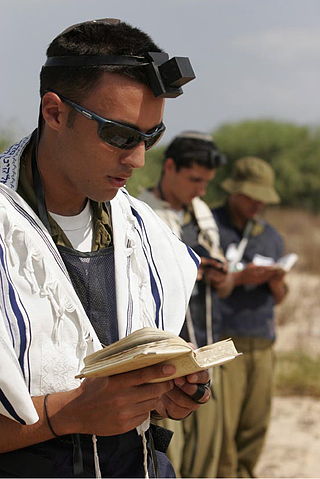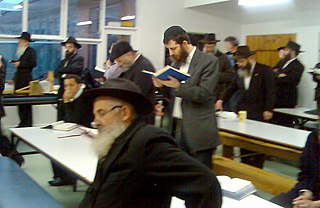Related Research Articles

Jewish prayer is the prayer recitation that forms part of the observance of Rabbinic Judaism. These prayers, often with instructions and commentary, are found in the Siddur, the traditional Jewish prayer book.

Shema Yisrael is a Jewish prayer that serves as a centerpiece of the morning and evening Jewish prayer services. Its first verse encapsulates the monotheistic essence of Judaism: "Hear, O Israel: YHWH our God, YHWH is one", found in Deuteronomy 6:4.
Ahava rabbah is the name given in Ashkenazi Jewish custom to the blessing recited immediately before the Shema as part of the Shacharit (morning) prayer. The name is taken from the first words of the prayer.

Mincha is the afternoon prayer service in Judaism.
A piyyuṭ is a Jewish liturgical poem, usually designated to be sung, chanted, or recited during religious services. Most piyyuṭim are in Mishnaic Hebrew or Jewish Palestinian Aramaic, and most follow some poetic scheme, such as an acrostic following the order of the Hebrew alphabet or spelling out the name of the author.

Berakhot is the first tractate of Seder Zeraim of the Mishnah and of the Talmud. The tractate discusses the rules of prayers, particularly the Shema and the Amidah, and blessings for various circumstances.

Zmanim are specific times of the day mentioned in Jewish law.
Kedushah is the name of several prayers recited during Jewish prayer. They have in common the recitation of two Biblical verses, Isaiah 6:3 and Ezekiel 3:12. These verses come from prophetic visions in which angels sing praises to God.
Siddur Sim Shalom refers to any siddur in a family of siddurim, Jewish prayerbooks, and related commentaries, published by the Rabbinical Assembly and the United Synagogue of Conservative Judaism.
Pesukei dezimra, or zemirot as they are called in the Spanish and Portuguese tradition, are a group of prayers that may be recited during Shacharit. They consist of various blessings, psalms, and sequences of other Biblical verses. Historically, reciting pesukei dezimra in morning prayer was a practice of only the especially pious. Over the course of Jewish history, their recitation has become widespread custom among all of the various rites of Jewish prayer.
Baruch HaShem Le'Olam is a compilation of 18 verses from Tanach that is recited by some Jewish communities during weekday Maariv between Shema and Amidah. Its name is from the first 3 words of the first verse.

Maariv or Maʿariv, also known as Arvit, or Arbit, is a Jewish prayer service held in the evening or night. It consists primarily of the evening Shema and Amidah.
Yotzer ohr, also known as Birkat yotzer or Birkat Yotzer Or, is the first of the two blessings recited before the Shema during Shacharit, the morning religious services of Judaism.
Ahavat Olam is the second prayer that is recited during Maariv. It is the parallel blessing to Ahava Rabbah that is recited during Shacharit, and likewise, is an expression to God for the gift of the Torah.
Emet V'Emunah is the paragraph that is recited immediately following Shema during Maariv, two fundamental prayers of virtually al forms of Judaism practiced today. Its recitation fulfills the obligation to recall the Exodus from Egypt during the evening.
In Judaism, Hashkiveinu is the second blessing following the Shema during Maariv. It is a petitionary prayer to be able to lie down in peace at night and to return to life the following day.
The Baladi-rite Prayer is the oldest known prayer-rite used by Yemenite Jews, transcribed in a prayer book known as a tiklāl in Yemenite Jewish parlance. "Baladi", as a term applied to the prayer-rite, was not used until prayer books arrived in Yemen in the Sephardic-rite.

The Italian Nusach is the ancient prayer rite (nusach) of the long-standing Italian Jewish (Italkim) community on the Italian Peninsula, used by Jews who are not of Ashkenazi or Sephardic origin.
References
- ↑ Shema is for Real By Joel Lurie Grishaver, page 62
- ↑ Teaching Tefilah: Insights and Activities on Prayer By Bruce Kadden, Barbara Binder Kadden, page 48
- ↑ Śiaḥ śarfe ḳodesh By Richard N. Levy, Hillel, the Foundation for Jewish Campus Life, page 57
- ↑ Teaching Tefilah: Insights and Activities on Prayer By Bruce Kadden, Barbara Binder Kadden, page 45
- 1 2 Shulchan Aruch OC 235:1.
- ↑ However, according to the minority opinion of the Rosh (cited in Bet Yosef 235:11), only the amidah of maariv can be recited early, and the blessings of Shema should be recited afterwards after nightfall.
- ↑ Angelo Piattelli and Hillel Sermoneta (eds.), Seder Tefillot ke-minhag benè Roma, Jerusalem 2014, page 117.